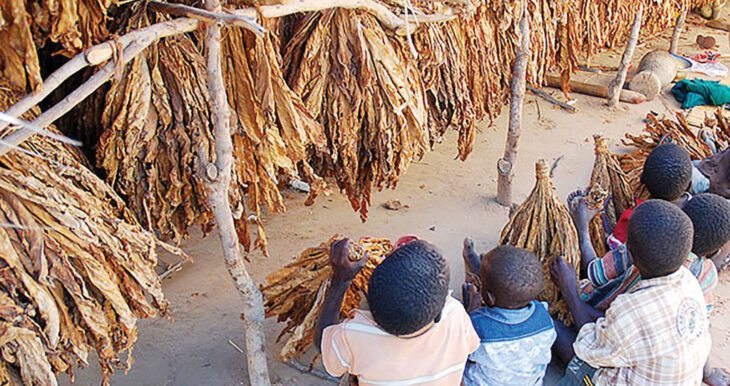The 5th Global Conference on the Elimination of Child Labour should ensure that the Tobacco Industry is kept away from efforts to end Child Labour in Tobacco Farms
The ILO integrated strategy for the tobacco sector has underscored that efforts to end child labour in tobacco farms must not be funded by entities with links to the tobacco industry like ECLT Foundation.
- Advertisement -
From 15 to 20 May 2022, the Republic of South Africa is hosting the 5th Global Conference on the Elimination of Child Labour. The tobacco industry has historically used child labour to infiltrate the global development agenda and portray a good image of itself. The industry has tried to influence policy by partnering with various United Nations (UN) agencies.
According to a 2021 WHO report on the status of tobacco production and trade in Africa, tobacco leaf production decreased globally by 13.9%; in Africa, however, it increased by 10.6%. In 2018, global tobacco leaf production was 6.3 million tonnes and in Africa it was 722 187 tonnes, representing 11.4% of global production. As regulations tighten in middle- and high- income countries, tobacco companies are increasingly targeting African countries to scale-up tobacco leaf production. Unfortunately, a lot of this increase comes at the detriment of children from poor households who miss school to be employed in tobacco farming to boost the family income.
- Advertisement -
For decades, the tobacco industry established and nurtured an alliance with the International Labour Organization (ILO). The industry also sought to influence the Food and Agriculture Organization (FAO), positioning experts on various FAO/World Health Organization (WHO) committees and working to directly fund research and policy groups sympathetic to the industry. Industry documents revealed how the industry worked found a way to avoid meaningful tobacco control measures of the United Nations International Children’s Emergency Fund (UNICEF).
- Advertisement -
Many of these agencies, however, have since cut ties with the industry, thus safeguarding their initiatives and policies from Big Tobacco’s commercial interests. However, the issue of child labour remains a fertile ground for the industry to remain influential within the global tobacco control space. Until 2019, tobacco industry entities had funding partnerships the ILO. It took a multitude of efforts from sustainable development and public health groups and several international non-governmental organisations, for the ILO to finally end tobacco industry funding.
Despite these important steps in keeping the tobacco industry out of the public health community, a disturbing exception is the tobacco industry-funded Eliminating Child Labour in Tobacco-Growing (ECLT) Foundation which is a member the UN Global Compact (UNGC), a voluntary initiative based on CEO commitments to implement universal sustainability principles and to take steps to support UN goals.
In an opinion piece published by Devex, Leonce Sessou, Executive Secretary of the African Tobacco Control Alliance (ATCA), stated that the tobacco industry derives huge profits in part because it manoeuvres to pay as little as possible for the crop that is the basis for its products.Bottom of Form He states that the practice is unfair, and propagates child labour and a cycle of poverty. He adds that the world’s children would be better served if the tobacco industry and its front groups — organizations that claim independence from the industry but are established, funded, or controlled by the industry’s corporate interests, thereby influencing policymakers and the public in its favour — are fully excluded from the U.N. system.
- Advertisement -
In the opinion piece, Leonce highlighted that ECLT’s activities confirm that the industry refuses to police itself, noting that ECLT does not call for changes in business practices that could alleviate poverty among tobacco farmers, and consequently, diminish the rate of child labour. Furthermore, ECLT does not advocate for the improvement of tobacco workers’ working and living conditions through unionization and collective bargaining. Neither does it support the external audit of tobacco companies and their supply chains, which could help identify and hold accountable those who profit from child labour. ECLT also does not oppose industry interference in the implementation of the WHO Framework Convention on Tobacco Control (WHO FCTC), which recommends that governments help tobacco farmers switch to more economically viable livelihoods.
According to Leonce, national governments must stop permitting children to work in tobacco fields and start holding the industry accountable if they want to deliver a better future for children in Africa and other tobacco-growing regions. Governments and the U.N. system need to reject partnerships and donations from the industry. That includes ECLT, which should be treated for what it is: a smokescreen for the tobacco industry’s public relations.
While the tobacco industry strives to be part of the global tobacco control discourse around child labour, its involvement so far has not ended the practice, but has rather ensured that its tobacco company funders, Philip Morris International, British American Tobacco, Japan Tobacco International, and Imperial Brands, benefit from citing its activities, including its associations with governments and UN agencies, in their environmental, social, and governance reports.
The ILO integrated strategy for the tobacco sector has underscored that efforts to end child labour in tobacco farms must not be funded by entities with links to the tobacco industry like ECLT Foundation.
So as representatives from governments, trade unions, the private sector, civil society, regional and international organizations, think tanks, academia, and youth and children from all over the world host plenaries, presentations, and side events during the 5th Global Conference on the Elimination of Child Labour, it is vital that an outcome be to integrate real solutions as provided by the WHO FCTC. This primarily involves regulating bad tobacco company practices, and financing economically viable alternatives that’s comprised of initiating activities that can be sourced from tobacco taxation. The tobacco companies must not be allowed to continue hindering progress in eliminating child labour, and instead be made to pay for damages caused.
- Advertisement -


